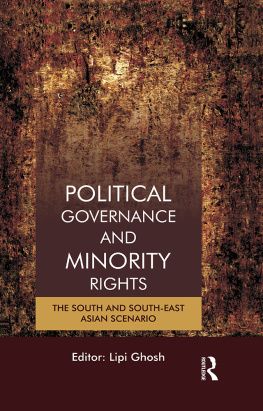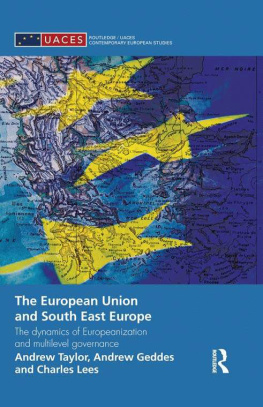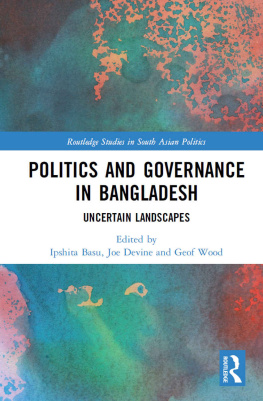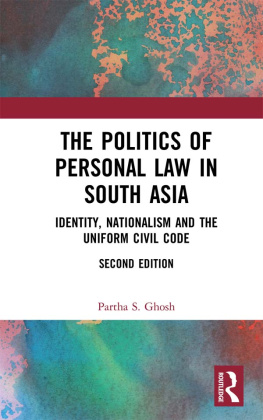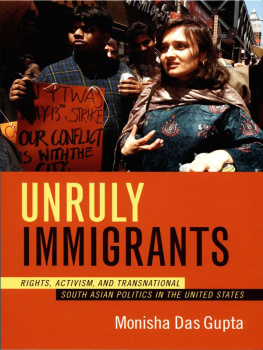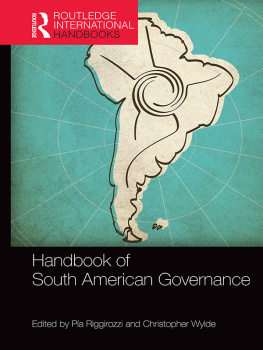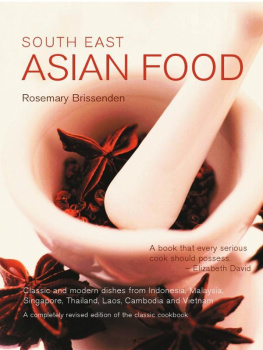First published 2009 by Routledge
2 Park Square, Milton Park, Abingdon, Oxfordshire OX14 4RN
52 Vanderbilt Avenue, New York, NY 10017
Routledge is an imprint of the Taylor & Francis Group, an informa business
First issued in paperback 2019
Transferred to Digital Printing 2009
Copyright 2009 Lipi Ghosh
Typeset by
Star Compugraphics Private Limited
D-156, Second Floor
Sector 7, Noida 201 301
All rights reserved. No part of this book may be reprinted or reproduced or utilised in any form or by any electronic, mechanical, or other means, now known or hereafter invented, including photocopying and recording, or in any information storage or retrieval system, without permission in writing from the publishers.
Notice:
Product or corporate names may be trademarks or registered trademarks, and are used only for identification and explanation without intent to infringe.
British Library Cataloguing-in-Publication Data
A catalogue record of this book is available from the British Library
ISBN: 978-0-415-55071-0 (hbk)
ISBN: 978-0-367-17641-9 (pbk)
Mushirul Hasan
Communities, their formation, evolution and transformation have formed the grist of academic writing for centuries. In South and South-East Asia, the question of communities minorities, majorities, alien, indigenous has assumed a special inflection thanks to the legacy of colonialism and the vagaries of post-colonial politics and anxieties. Not surprisingly therefore, studies and scholarship on communities have generated some of the most influential and engaging debates of political theory. The result of such deliberations has enabled a fresh look at some of the more contentious issues that nation-states continue to grapple with in the form of dissent and politics of ethnicity. At the same time, there has been a closer scrutiny of historical practices that have produced multiple and competing understandings of communities making it important to unravel the intersection of the complicities of historical knowledge with the formations of modern power. The present volume represents one such attempt to unravel the play of the past with the predicaments of the present, to provide a much-needed comparative perspective on the problems of community rights and political governance in South and South-East Asia.
Across the past decades, there has been an exhaustive investigation and interrogation of the term community and of its multiple connotations, its historical location, its production as a consequence of historical thought with its aggrandizing agenda, its relationship with the nation, the highest form of the imagined community. This investigation has facilitated a more nuanced approach to history-writing that has begun to contest categories such as culture, identity, nation and tradition and alongside that, a more careful understanding of subaltern claims to social justice and to a vast range of rights and entitlements. Second, these approaches have produced a new and visible turn in the writing of contemporary history that looks more closely at governance and governmentality, state structures and processes of continual negotiation with stakeholders and marginalized groups, of identity politics and the politicization of religion and finally of the pressures of globalization on governance and community rights.
The present volume straddles both these emergent tendencies and trends in scholarship and presents us with a wide-ranging selection of essays dealing with current scenario in South and South-East Asia. The inclusion of South-East Asia and Indias neighbouring countries, like Nepal, Bangladesh and Sri Lanka, is important not merely because they serve to give us empirical details and thereby help identify the crises of governance but also because they help initiate a genuine dialogue that advances the cause of a comparative methodology to examine the problems and processes in post-colonial Asia. Admittedly countries like Nepal and Thailand were not formally colonized and therefore did not go through the process of decolonization or any such struggle for self-definition. For both these countries, the very question of scrapping the monarchy was important and momentous in itself, and one that brought numerous challenges to the fore.
The crisis of governance has been acutely perceived in the regions of South and South-East Asia, defying quite clearly the assumptions held by Immanuel Kant about the inherently peaceful nature of democracies. The lamentable track record of violence against Muslims, women, tribals, of the pressures of displacement and immigration in parts of India, the genocide in Sri Lanka, the extra burdens faced by women during war, the conditions of tribals and minorities in Bangladesh and Pakistan, the vagaries of politics in Nepal and Thailand are telling and seem hardly a positive testimony to the successful functioning of either democracy or to the commitment and political will of governments in Asia. Most of the countries in South Asia are witnessing insurgency movements, all of which impede effective government in one way or the other. It is in this context that a volume such as the present makes a decidedly important contribution, in that it sets out in graphic detail the actual pressures that minorities face and how in their efforts to thwart what they see as domination and oppression by the ruling state, there is a complex intersection of violence, criminality and marginalization. The essay on the carnage in Gujarat that was at one level the culmination of a hate campaign and which saw unprecedented barbarities inflicted on the bodies of women and children tells us a chilling story, especially of how the state became the space of anarchy and not that of regulation as it claimed to be. Complicity of state officials and the crisis of gov-ernmentality, and narratives of victimhood force us to re-examine questions of constitutional safeguards and what it actually means to be a minority. Other essays take up the question of womens peace initiatives an area that merits substantial investigation while the issue of migration and displacement discussed in the context of Bangladesh and North-East India reminds us again and again how internal failures conflate into external security issues. It is well-known that persecution of minorities have immediate echoes across borders, and given the perils of the nuclear option, it is prescient that we continue to keep the dialogue going, which is the only way forward.
Whether knowledge is indeed power may be debatable, but that it can be an enabling device to oversee a common humanity, is not in doubt. Problems of governance need to be continuously examined and scrutinized in the context of voices that strain to be heard, sometimes stridently, at other times in despair. Discursive formations backing right-wing movements and articulations need to be identified, understood and battled against if we are to preserve the cherished ideals of sovereignty, secularism and democracy. These are not just words to be repeated in a function of ceremony but values that must be cultivated if we are to live with some degree of equanimity in the twenty-first century. This book edited by Lipi Ghosh is a welcome addition for all of us who wish to gain more access to the problems of developing countries in Asia and thereby to share our sense of collective rights and obligations and to try and build a public opinion for inclusion and inclusiveness in our political life.


